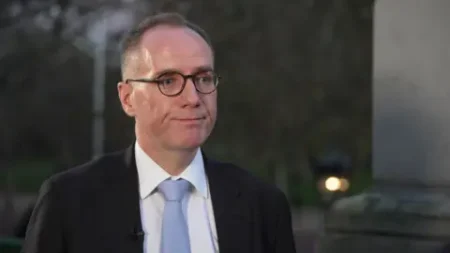In a landmark move to enhance online safety, Ofcom, the media regulator in the United Kingdom, announced that approximately 6,000 websites permitting access to pornographic material will be implementing age verification checks starting from Friday. This initiative is part of a broader effort to safeguard children from potentially harmful content online. Dame Melanie Dawes, the CEO of Ofcom, emphasized the significance of this development, noting that it is a response to increasing demands for improved child safety on the internet.
Dawes further remarked on the positive momentum she’s observed within the technology sector, stating during an interview with BBC Radio Four’s flagship program, the Today programme, that this initiative symbolizes concrete steps taken by multiple platforms, including notable names like Elon Musk’s X (formerly Twitter). However, despite these hopeful developments, it was reported that some major adult websites were not enforcing age checks as of that Friday morning.
Experts remain skeptical about the efficacy of these new age verification protocols, raising concerns over the potential for children to bypass these systems. The regulator revealed that various platforms, including Discord, X, the social media network Bluesky, and the dating application Grindr, had agreed to introduce measures to verify users’ ages. Additionally, commitments had been secured from popular sites such as Pornhub, recognized as one of the most frequented adult sites in the UK, and the community platform Reddit.
Age verification measures on Reddit have ostensibly begun, applying to a variety of individual subreddits that cover topics such as alcohol consumption. The Technology Secretary, Peter Kyle, supported the age-check measures, insisting that they reflect “common sense” regulations for the digital landscape. He underscored that age verification is commonplace in many aspects of daily life, drawing attention to the difference in experiences when purchasing age-restricted products versus accessing explicit content online.
The newly instituted age verification protocols have stimulated discussions around online safety legislation, particularly through the lens of the Online Safety Act. This set of rules aims to clarify how age checks could function in the UK, detailing which platforms would be implicated in these requirements, including the aforementioned sites.
Chris Sherwood, the chief of the children’s charity NSPCC, voiced his approval for the age verification measures, highlighting that services can no longer neglect their obligation to protect children from harmful content. He insists it is high time tech companies take serious action to ensure online environments do not expose children to inappropriate materials. His sentiments were echoed by Professor Elena Martellozzo from the University of Edinburgh, who argued that the latest regulations signal to tech companies the non-negotiable priority of child safety and protection.
Despite these efforts, not all are convinced that Ofcom’s measures are sufficiently robust to ensure children’s safety online. The Molly Rose Foundation, established in the wake of the tragic suicide of Molly Russell, a 14-year-old who encountered harmful content online, called for more stringent legislation for greater children’s protection. Andy Burrows, the foundation’s CEO, criticized Ofcom for prioritizing the interests of significant tech firms over the safety of children, asserting that the financial thresholds for compliance are inadequate to motivate substantial action from larger companies.
Meanwhile, Derek Ray-Hill, acting head of the Internet Watch Foundation, acknowledged the importance of the new rules while expressing the view that additional work is required to enhance safety features on these platforms. Others voiced concerns that these age verification processes could inadvertently lead youth and non-conforming individuals toward less regulated online spaces, which may harbor more explicit content.
These discussions highlight a wide-ranging debate about the balance between safety and privacy, especially for individuals in vulnerable communities like LGBTQ+ populations, who may be hesitant to reveal personal information. The ongoing dialogue will likely shape the evolution of online safety regulations and the responsibilities tech companies carry to protect the most susceptible users in the age of the Internet. The question remains: will these new rules effectively deter harmful online interactions, or will they lead to unintended consequences in the digital landscape?











